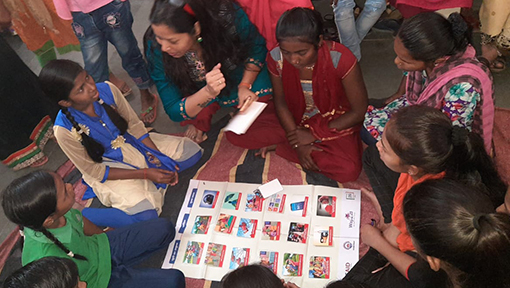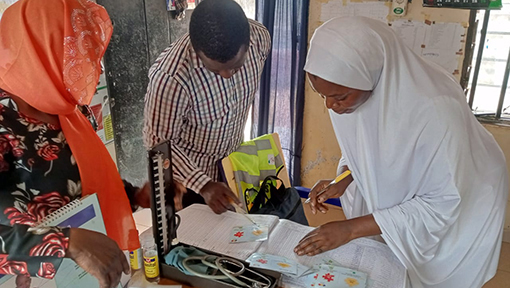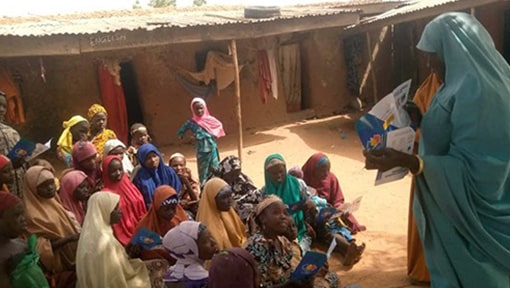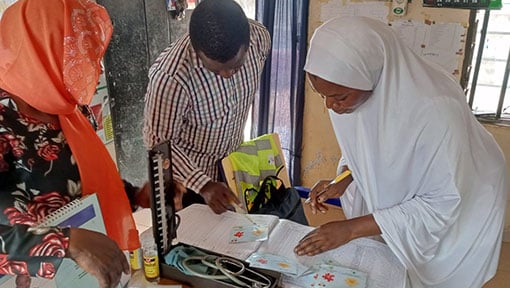TCIHC Helps Urban Primary Health Centers Become Adolescent-Friendly in Allahabad, India
Contributors: Ipsha Singh and Deepti Mathur

Adolescents engaged in an SRH game on Adolescent Health Day at the Daraganj 1 UPHC in Prayagraj city.
The Daranganj urban primary health care center (UPHC) in Prayagraj city (Allahabad, Uttar Pradesh) is alive with the sound of excited chatter, laughter and happy noises. That’s because it is Adolescent Health Day (AHD) at the facility – a day where unmarried adolescent boys and girls ages 15-19 years can seek a variety of health services and engage with facility staff.
Holding AHDs is a strategy under Rashtriya Kishor Swasthya Karyakram (RKSK), a Government of India (GOI) program launched by the Ministry of Health & Family Welfare to improve health-seeking behavior among young unmarried adolescents, 10-19 years of age.
However, RKSK guidelines emphasize that AHDs can only be conducted in facilities classified as adolescent-friendly health centers (AFHCs), a classification that was limited to just secondary and tertiary care facilities such as district women hospitals and medical colleges. Limiting services to the higher level of care facilities restricted linkages between primary and speciality care services, especially for vulnerable populations, like unmarried boys and girls and the urban poor.
I always thought it is only when one is sick we go to a clinic. One can also go to a clinic when we need information about our health is something I just came to know.” – A 15-year-old girl who attended the AHD at the Daranganj UPHC
The Challenge Initiative for Healthy Cities (TCIHC) helped the RKSK program get UPHCs classified as adolescent friendly in five TCIHC-supported cities – Allahabad, Firozabad, Gorakhpur, Saharanpur and Varanasi. A critical feature of an AFHC is the presence of a dedicated counselor for adolescent services. Working with the Chief Medical Officer (CMO), TCIHC identified one staff nurse from each of the 96 UPHCs in the five cities and strengthened their capacity to provide adolescent health counseling, following the RKSK curriculum.
In addition, a staff-wide whole site orientation (WSO) – which ensures that all staff have a basic understanding about adolescent and youth sexual and reproductive health needs – was conducted in all 96 UPHCs to guarantee a welcoming and accessible environment for unmarried youths to access sexual reproductive health (SRH) information and services. Nearly 1,300 UPHC staff, including doctors, staff nurses, janitors and pharmacists, were oriented on providing SRH information and services to both married and unmarried adolescents and youth, 15-24 years of age, as a result.
Until this WSO happened, I had never thought that something special needs to be done for adolescents. In fact, all the staff of this facility never felt that adolescents have any such [contraceptive] need. However, I realized that adolescents also have this need when I saw 60 boys and girls turn up on the day of AHD.” – Medical-Officer-In-Charge (MOIC) of Shahpur UPHC, Gorakhpur
With staff trained, it was then time to improve the provision of adolescent-friendly supplies at the UPHC. TCIHC utilized city coordination committee (CCC) platforms to inform city officials on the importance of stocking iron and folic acid (WIF), Albendazole (deworming medicines), sanitary napkins, multivitamin tablets and condoms. By coordinating efforts with RKSK at the state level, TCIHC succeeded in establishing stocks of the needed supplies at the UPHC. With this, UPHCs added adolescent services to their citizen charter, which had not been previously included.
In November 2019, TCIHC supported AHDs at select UPHCs in the five cities. Accredited Social Health Activists (ASHA) and Anganwadi Workers sensitized and mobilized the community. Mobilizing boys and girls for the AHD was made easier because the ASHAs could refer to their urban health index registers (UHIR) to identify households with 15- to 19-year-old boys and girls.
I feel such an event should be conducted once every month. Earlier, I wondered what will happen but I saw several boys and girls of my age had turned up here and, upon meeting them, I felt this is a wonderful platform where we can ask questions, share our thoughts and suggest also.” – A teenage boy who attended the AHD at the Daranganj UPHC
As per RKSK guidelines, the half-day AHD included a nutrition kiosk and private counseling corner for boys and girls. Providers trained in AFHS by TCIHC conducted “circle time” with boys and girls, respectively. The sessions integrated games to break the ice between providers and participants and provide SRH information. A game developed about self-risk perception set the ground work for a frank discussion on SRH. Following the activity, participating boys and girls were invited to write down questions with respect to SRH, which were then answered by the MOIC or staff nurse.
The youth asked questions about body changes as a result of puberty and self-image, gender discrimination in families, discomfort when negotiating with a partner when in a relationship, masturbation, and discomfort during menstruation.
A significant number of participants chose to meet with the staff nurse/counselor in private. Distribution of WIFs and Albendazole, screening of hemoglobin estimation and body mass index were made compulsory for every adolescent participant. Referrals were made to the district hospital for more complex services.
As of February 2020, AHDs have been conducted in 70 UPHCs across the five cities with close to 2,500 youth in attendance. Of these, a higher proportion of girls (66%) turned out for the event. However, only half of them went for counseling and clinical screening. And even though only 34% of the participants were boys, a higher proportion of them underwent counseling and clinical screening. This informs the need to build self-efficacy among girls and also that risk-taking behavior may be higher among boys. Interestingly, these results are compelling medical officers of UPHCs to ask ASHAs to inquire as to the health needs of adolescents during their household visits – something that had not happened before.
AHDs have captured the attention of government officials. As a result, Chief Medical Officers in Allahabad, Firozabad, Saharanpur and Gorakhpur issued directives to conduct facility-based AHDs on the eighth of every month across all UPHCs in their cities.






